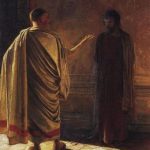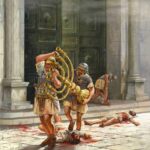“Judas then, having received the Roman cohort and officers from the chief priests and the Pharisees, came there with lanterns and torches and weapons”. (J 18: 3)
Only Saint John, who wrote his gospel the latest, mentions Roman soldiers when Jesus was arrested in the Garden of Olives. However, it is unlikely that they would be there. The arrest of Jesus was an internal affair of the highest Jewish authorities. On the other hand, Saint John could have used the concept of a cohort in an imprecise way, he might not have meant a unit of several hundred soldiers, this term he could have defined any guard. It could also be the temple guard.
In the time of Jesus, the cooperation of the Jews with the Romans did not go well, especially in the reign of Pontius Pilate. According to Joseph Flavius, who described the atmosphere of that time, the relationship was even very tense. Pilate represented the Roman occupier, he disliked the Jews, while the Jews hated him even more.
Jesus’ arrest took place quietly under the cover of night. The Jews did not need an army, the temple guards were more than enough. There weren’t many apostles, and they weren’t too brave. If Jesus had been arrested by Roman soldiers, they would have done so officially and would have brought him to whoever had given the order, the governor of Pontius Pilate, and not to the palace of the high priest.
Roman soldiers did not appear with Jesus until he handed him over to Pilate, and it is possible that they were with him only until his side was pierced, after his death. Perhaps they were also not watching his tomb at all. Pilate’s words, “You have a guard. Go, make it as secure as you can” (Mt 27:65) did not necessarily prove that he had given them his own soldiers, it could have meant that he consented to the protection of the tomb on his own. After all, the Jews had their own temple guards.
Roman soldiers would not have run away from the grave, nor could they advertise that they were sleeping on duty. Attempting to leave their post or sleep while on duty could have resulted in the death penalty for them. After escaping from the tomb, the guards went to explain themselves to the high priests. It is clear from this that the high priests must have been their superiors. If they were Roman soldiers, they would have reported it to Pilate.
Of course, it is possible that Roman soldiers guarded Jesus’ tomb, because would the temple guards have to explain to Pilate that they had not fulfilled their duties?







